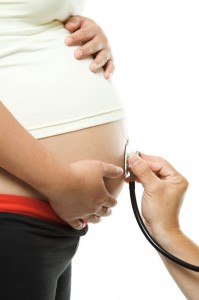 If you’re pregnant or about to become pregnant, your number one priority is carrying your baby safely and healthily to full-term. No matter what your current state of health, or how prepared you feel you are to have a healthy pregnancy, every new mom should understand the warning signs of high-risk pregnancies.
If you’re pregnant or about to become pregnant, your number one priority is carrying your baby safely and healthily to full-term. No matter what your current state of health, or how prepared you feel you are to have a healthy pregnancy, every new mom should understand the warning signs of high-risk pregnancies.
What is a high-risk pregnancy?
Generally, a pregnancy is defined as high-risk if you or your baby has an increased chance of facing a health problem. Such problems could be caused by one of several underlying conditions, including:
These conditions put you and your baby at risk for complications like slowed fetal growth, a preterm labor, preeclampsia, or issues with the placenta.
Other factors that could result in a high-risk pregnancy include:
- If you are under 17 or over 35
- You use alcohol or illegal drugs
- You smoke
- You have an infection, such as HIV, hepatitis C, syphilis, cytomegalovirus (CMV), chickenpox, rubella, or toxoplasmosis
- You are having a multiple pregnancy
- You have had three or more miscarriages
- Your baby has been diagnosed with a genetic condition such as Down syndrome, or a heart, lung, or kidney condition
- You have been diagnosed with a serious condition such as heart valve problems, sickle cell disease, asthma, lupus, or rheumatoid arthritis
- You have had a serious problem with a previous pregnancy, such as a preterm labor, preeclampsia, or seizures (eclampsia)
- You are taking certain medications such as lithium, valproic acid, or carbamazepine
High-risk pregnancy treatment
Your OB-GYN will be able to diagnose whether or not your pregnancy is high-risk. If you are diagnosed as being high-risk, you should expect more frequent visits to your doctor than women whose pregnancies are not high-risk. Your OB-GYN will likely want you to receive more frequent ultrasound tests to confirm your baby is developing and growing at the proper rate. Your doctor will also closely monitor your blood pressure and more frequently test your urine for a protein that indicates preeclampsia or a urinary tract infection. If you have diabetes, asthma, or high blood pressure, your doctor may prescribe medications to help monitor such conditions.
Keep in mind that just because your pregnancy has been defined as high-risk does not mean that your baby will definitely be born with health issues. Under the care of your OB-GYN, and by following your prescribed treatment plan, you can welcome your new, healthy baby into the world without worry.
More
 What if your doctor tells you you’re considered a high-risk pregnancy? What does that mean, and what can you do about it?
What if your doctor tells you you’re considered a high-risk pregnancy? What does that mean, and what can you do about it?
Being called “high-risk” may sound scary, but it’s just a way for doctors to ensure that you get special attention during your pregnancy. It usually means that you or your baby has an increased chance of a health problem—not that you or the baby will definitely have one.
What kind of conditions will put you in the high-risk category?
- You have a health problem such as diabetes, cancer, high blood pressure, kidney disease, heart valve problems, sickle cell disease, asthma, lupus, rheumatoid arthritis or epilepsy
- You smoke or use alcohol or illegal drugs
- You are younger than 17 or older than 35
- You are pregnant with more than one baby
- You’ve had three or more miscarriages
- Your baby has a genetic condition, such as Down syndrome, or a heart, lung, or kidney problem
- You’ve had past problems such as preterm labor, preeclampsia or eclampsia
- You’ve already had a baby with a genetic condition
- You have an infection, such as HIV, hepatitis C, cytomegalovirus (CMV), chicken pox, rubella, toxoplasmosis or syphilis
Will my doctor treat me differently for a high-risk pregnancy?
You’ll have more regularly scheduled visits to the doctor, and you may have more ultrasound tests to keep an eye on your baby’s growth. Genetic testing may also be done, especially if you are 35 or older or had a genetic issue in a past pregnancy.
Can a pregnancy become high risk later?
Yes. Sometimes a medical condition develops during pregnancy for either mom or baby causes a pregnancy to become high risk. Some complications include:
- problems with the uterus, cervix or placenta
- severe morning sickness
- too much amniotic fluid
- too little amniotic fluid
- Rh (rhesus) sensitization, which can occur if your blood type is Rh negative and your baby’s blood type is Rh positive
What can I do to stay healthy during a high-risk pregnancy?
- Seek regular prenatal care so your health care provider can monitor your health and your baby’s. Visit a specialist in maternal-fetal medicine, genetics, pediatrics or other areas if necessary.
- Establish a good relationship with your doctor and with other doctors in the practice. You’ll want to feel comfortable discussing any concerns you might have and know that any of them can treat you if necessary.
- Eat a healthy diet. A daily prenatal vitamin can help fill any gaps. Consult your health care provider if you have special nutrition needs due to a health condition, such as diabetes.
- Gain weight wisely. Work with your health care provider to determine what’s right for you.
- Avoid risky substances. If you smoke, drink alcohol or do illegal drugs—quit. But get your health care provider’s OK before you start or stop taking any medications or supplements.
- Talk to your doctor about any health problems you have and any medications you are taking.
At Chouchani, Sayegh and Bagnarello, we pride ourselves on providing personal and friendly care to each and every patient. If you have any questions or concerns about your pregnancy or your prenatal or postnatal health, call us any time at 716.633.6363.
Disclaimer: The medical information provided in this article is of a general nature and cannot substitute for the advice of a medical professional.
More
 If you’re pregnant or about to become pregnant, your number one priority is carrying your baby safely and healthily to full-term. No matter what your current state of health, or how prepared you feel you are to have a healthy pregnancy, every new mom should understand the warning signs of high-risk pregnancies.
If you’re pregnant or about to become pregnant, your number one priority is carrying your baby safely and healthily to full-term. No matter what your current state of health, or how prepared you feel you are to have a healthy pregnancy, every new mom should understand the warning signs of high-risk pregnancies.
